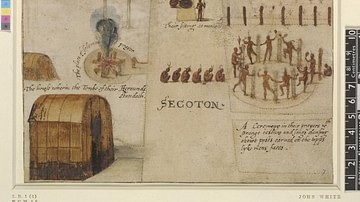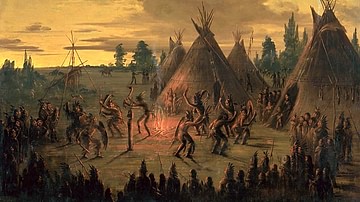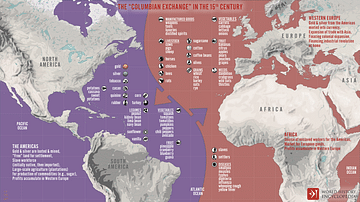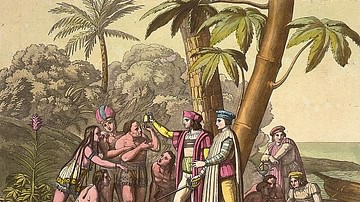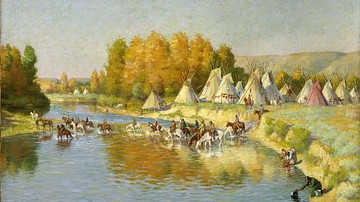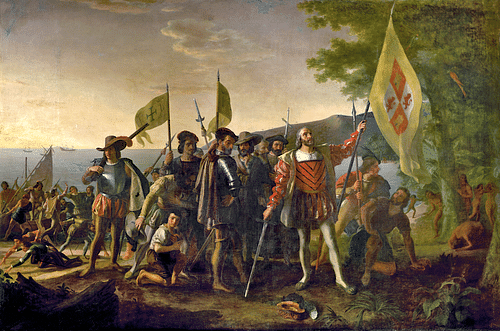
The Doctrine of Discovery is a policy enacted initially by the 15th-century Catholic Church proclaiming the right of Christian nations to take possession of the lands of non-Christians in the interest of saving their souls. Non-Christians were not recognized as legitimate landowners, and any lands 'discovered' by Christian explorers were claimed as the property of the discoverers' nation.
The Doctrine of Discovery (also known as the Discovery Doctrine) is articulated, first, by a papal bull issued in 1452, another in 1455, and the best-known in 1493, shortly after the 1492 expedition of Christopher Columbus and his 'discovery' of the so-called New World. The 1493 papal bull made clear the duty of Christian explorers to seize the lands of non-Christians for the purpose of Christianizing the inhabitants and bringing them within the folds of European Christian civilization.
Shortly after the European colonizers first encountered the indigenous population of the Americas in 1492, they returned armed with the policy issued by Pope Alexander VI in 1493, which claimed that any land, anywhere, not under the flag of a sovereign Christian nation, could be taken by whoever 'discovered' it, and whatever indigenous people found there converted to Christianity.
The Doctrine of Discovery deprived the Native Peoples of the Americas of their land in the colonial era, was recognized as legitimate by the United States Supreme Court in 1823, and remains on the law books in the present day despite being repudiated by Pope Francis in March of 2023 and challenged by modern-day legal scholars. The Land Back Movement, initiated and led by Native Peoples of North America, is presently challenging the legality and morality of the Doctrine which, even though recognized as unjust and racist, still informs the policies of Canada and the United States in their recognition of Native American land rights.
Native American & European Concepts of Land
The Native American concept of land ownership differed significantly from the European understanding in that Native Americans did not believe one could own land while, to the European colonizers, owning land was a God-given right. The Europeans who colonized North America beginning in the 16th and 17th centuries understood land ownership in accordance with the biblical passage of Genesis 1:28:
God blessed them and said to them, "Be fruitful and multiply; fill the earth and subdue it. Rule over the fish in the sea and the birds in the sky and over every creature that moves on the ground."
To the Europeans, the land was something to be tamed, cultivated, 'civilized', for their own benefit, as their God had decreed, but to the Native Americans, the land was a sentient being, their mother, a close relation to be cared for and respected. The Native American concept of the land is explained by Cultural Landscapes Manager for the Grand Canyon Trust, Talia Boyd:
The idea of 'owning' land is a foreign concept for Native peoples. The land is sentient. It encompasses many life forms and spaces. It holds immense energy. From a Native perspective, one cannot 'own' land, yet one may live with the land. Our regenerative relationships to land are based on generations of deep interconnectedness that have been taught through our cosmologies, ceremonies, and languages. Native peoples acknowledge that these on-going connections require responsibilities to the natural world. We provide offerings and prayers to the land for its healing. Traditional teachings instruct us to maintain deep respect for land, life, and our four-legged and winged relatives – all our relations. (Boyd, 1)
The Europeans who arrived in North America had no such understanding of the land and, encouraged by the spirit of the Doctrine of Discovery, felt no need to try to understand how the indigenous population might view land ownership in a vastly different light from their own. The European immigrants viewed the Natives as uncivilized, non-Christian, savages whose beliefs about anything were inconsequential and whose lands were free for the taking.
History of the Doctrine
The Doctrine of Discovery not only justified the appropriation of the lands of non-Christians but also of their persons, condemning them to "perpetual slavery" as "enemies of Christ." Its first appearance was in the papal bull known as Dum Diversas ("Until Different") issued by Pope Nicholas V on 18 June 1452 to Alfonso V of Portugal to validate his appropriation of regions in West Africa. The bull reads, in part:
[We Grant] to the aforesaid King Alfonso to invade, search out, capture, vanquish, and subdue all Saracens and pagans whatsoever, and other enemies of Christ wheresoever placed, and the kingdoms, dukedoms, principalities, dominions, possessions, and all movable and immovable goods whatsoever held and possessed by them and to reduce their persons to perpetual slavery, and to apply and appropriate to himself and his successors the kingdoms, dukedoms, counties, principalities, dominions, possessions, and goods, and to convert them to his and their use and profit. (Indigenous Values Initiative, 1)
Pope Nicholas V then highlighted the policy in 1455 in encouraging Portugal to seize West African lands and subjugate the people in the interest of saving their souls. After Christopher Columbus' 1492 expedition to the Americas, a dispute between his Spanish sponsors and Portugal, who had also been engaged in colonization efforts in the region, resulted in the papal bull of Pope Alexander VI which established a line one hundred leagues west of the Azores and Cape Verde islands and gave Spain the rights of colonization west of it.
Catholic France and Protestant England, while not acknowledging the Doctrine specifically (or, in the case of England, repudiating it as having no authority over them), still maintained the spirit of the policy in claiming that Christian nations had a duty to spread the religion to non-Christians and, in doing so, were granted the right to seize non-Christian lands in the name of Christ. Any non-Christian lands were therefore understood to have been 'discovered' by whichever nation arrived there first and, by planting their nation's flag, the 'discoverers' claimed those lands for their country.

Once the English North American colonies had won their independence from Great Britain, the Doctrine of Discovery was invoked by Thomas Jefferson as Secretary of State in 1792 who declared that the policy which had held when the region was under British rule was still sound now that it had become an independent nation. Jefferson concluded this based on his understanding of Native Americans as "merciless savages", a phrase he uses in the Declaration of Independence as one of the reasons the colonies should be free because King George III of Great Britain (r. 1760-1820) had limited the colonists' expansion west and the further appropriation of Native American lands.
The Doctrine became part of United States municipal law in 1823 through adjudication of the legal case Johnson v. McIntosh. Johnson, who had inherited lands purchased from Native Americans prior to the American Revolution, sued McIntosh who had purchased those same lands from the United States government after the Revolution. Chief Justice John Marshall of the United States Supreme Court ruled that legitimate ownership of the land was established by discovery and possession as per the Doctrine of Discovery, and so no lands 'sold' by Native Americans to white settlers were legitimate because the Natives had no rights of ownership, only 'rights of occupancy' and, that being so, could no more sell a piece of land than someone could sell an apartment they are renting today. Scholar Roxanne Dunbar-Ortiz comments:
Writing for the majority, Chief Justice John Marshall held that the Doctrine of Discovery had been an established principle of European law and of English law in effect in Britain's North American colonies and was also the law of the United States. The Court defined the exclusive property rights that a European country acquired by dint of discovery: "Discovery gave title to the government, by whose subjects, or by whose authority, it was made, against all other European governments, which title might be consummated by possession." Therefore, European and Euro-American "discoverers" had gained real-property rights in the lands of Indigenous peoples by merely planting a flag. (Indigenous Peoples' History, 199-200)
The Doctrine of Discovery continues to inform legal decisions regarding Native American land rights in the present day. As recently as 2005 in the case of City of Sherrill v. Oneida Indian Nation of New York, Justice Ruth Bader Ginsburg writing for the majority, cited the doctrine as a basis for ruling against the Oneida.
Text in Part
The following excerpt from the 1493 papal bull Inter caetera ("Among Other Works") is taken from the History Resources page of The Gilder Lehrman Institute of American History. The main purpose of the bull was to resolve the tensions between Portugal and Spain over trade and colonization in the "New World", but it encouraged the appropriation of the lands of indigenous peoples as set forth in the bull of Dum Diversas from 1452.
Wherefore, as becomes Catholic kings and princes, after earnest consideration of all matters, especially of the rise and spread of the Catholic faith, as was the fashion of your ancestors, kings of renowned memory, you have purposed with the favor of divine clemency to bring under your sway the said mainlands and islands with their residents and inhabitants and to bring them to the Catholic faith. Hence, heartily commending in the Lord this your holy and praiseworthy purpose, and desirous that it be duly accomplished, and that the name of our Savior be carried into those regions, we exhort you very earnestly in the Lord and by your reception of holy baptism, whereby you are bound to our apostolic commands, and by the bowels of the mercy of our Lord Jesus Christ, enjoy strictly, that inasmuch as with eager zeal for the true faith you design to equip and despatch this expedition, you purpose also, as is your duty, to lead the peoples dwelling in those islands and countries to embrace the Christian religion; nor at any time let dangers or hardships deter you therefrom, with the stout hope and trust in your hearts that Almighty God will further your undertakings.
And, in order that you may enter upon so great an undertaking with greater readiness and heartiness endowed with benefit of our apostolic favor, we, of our own accord, not at your instance nor the request of anyone else in your regard, but out of our own sole largess and certain knowledge and out of the fullness of our apostolic power, by the authority of Almighty God conferred upon us in blessed Peter and of the vicarship of Jesus Christ, which we hold on earth, do by tenor of these presents, should any of said islands have been found by your envoys and captains, give, grant, and assign to you and your heirs and successors, kings of Castile and Leon, forever, together with all their dominions, cities, camps, places, and villages, and all rights, jurisdictions, and appurtenances, all islands and mainlands found and to be found, discovered and to be discovered towards the west and south, by drawing and establishing a line from the Arctic pole, namely the north, to the Antarctic pole, namely the south, no matter whether the said mainlands and islands are found and to be found in the direction of India or towards any other quarter, the said line to be distant one hundred leagues towards the west and south from any of the islands commonly known as the Azores and Cape Verde.
With this proviso however that none of the islands and mainlands, found and to be found, discovered and to be discovered, beyond that said line towards the west and south, be in the actual possession of any Christian king or prince up to the birthday of our Lord Jesus Christ just past from which the present year one thousand four hundred ninety-three begins. And we make, appoint, and depute you and your said heirs and successors lords of them with full and free power, authority, and jurisdiction of every kind; with this proviso however, that by this our gift, grant, and assignment no right acquired by any Christian prince, who may be in actual possession of said islands and mainlands prior to the said birthday of our Lord Jesus Christ, is hereby to be understood to be withdrawn or taking away. Moreover, we command you in virtue of holy obedience that, employing all due diligence in the premises, as you also promise—nor do we doubt your compliance therein in accordance with your loyalty and royal greatness of spirit—you should appoint to the aforesaid mainlands and islands worthy, God-fearing, learned, skilled, and experienced men, in order to instruct the aforesaid inhabitants and residents in the Catholic faith and train them in good morals.
Furthermore, under penalty of excommunication "late sententie" to be incurred "ipso facto," should anyone thus contravene, we strictly forbid all persons of whatsoever rank, even imperial and royal, or of whatsoever estate, degree, order, or condition, to dare without your special permit or that of your aforesaid heirs and successors, to go for the purpose of trade or any other reason to the islands or mainlands, found and to be found, discovered and to be discovered, towards the west and south, by drawing and establishing a line from the Arctic pole to the Antarctic pole, no matter whether the mainlands and islands, found and to be found, lie in the direction of India or toward any other quarter whatsoever, the said line to be distant one hundred leagues towards the west and south, as is aforesaid, from any of the islands commonly known as the Azores and Cape Verde; apostolic constitutions and ordinances and other decrees whatsoever to the contrary notwithstanding. We trust in Him from whom empires and governments and all good things proceed, that, should you, with the Lord's guidance, pursue this holy and praiseworthy undertaking, in a short while your hardships and endeavors will attain the most felicitous result, to the happiness and glory of all Christendom.
Conclusion
The Doctrine of Discovery is rarely mentioned today in conversations concerning the land rights of indigenous peoples because it is so blatantly racist, unjust, and immoral, but it continues to inform the policies of Canada and the United States (as well as Australia and New Zealand) regarding the return of lands appropriated from the indigenous people. Dunbar-Ortiz sums up the effects of the Doctrine:
According to the centuries-old Doctrine of Discovery, European nations acquired title to the lands they "discovered", and Indigenous inhabitants lost their natural right to that land after Europeans had arrived and claimed it. Under this legal cover for theft, Euro-American wars of conquest and settler colonialism devastated Indigenous nations and communities, ripping their territories away from them and transforming the land into private property, real estate. Most of that land ended up in the hands of land speculators and agribusiness operators, many of which, up to the mid-nineteenth century, were plantations worked by another form of private property, enslaved Africans. Arcane as it may seem, the doctrine remains the basis for federal laws [in the United States] still in effect that control Indigenous peoples' lives and destinies, even their histories, by distorting them. (Indigenous Peoples' History, 198)
Increasing recognition of the injustice of the Doctrine of Discovery informs the initiative to replace Columbus Day in the United States with Indigenous People's Day and also informs the Land Back Movement in Canada and the United States which advocates for the return of Native American lands in the name of justice.


